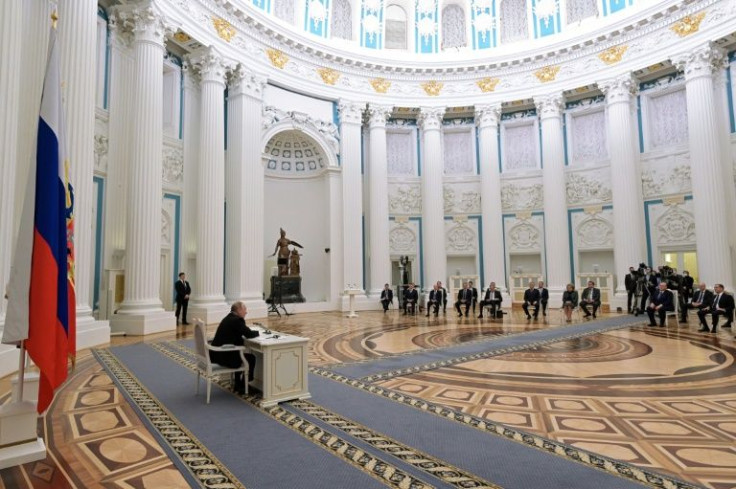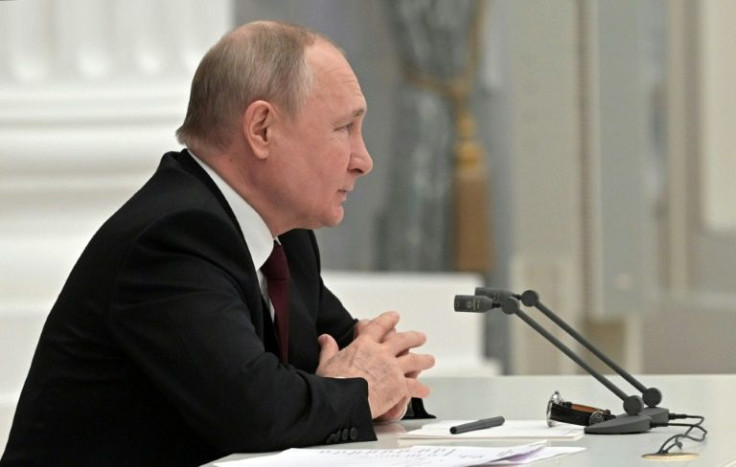Kremlin Top Brass Urge Putin To Recognise Ukraine Rebels
President Vladimir Putin sat behind a table in the Kremlin Monday as his top officials one by one made empassioned speeches urging him to recognise the independence of east Ukraine's rebel republics.
The highly unusual Kremlin security council meeting was unscheduled, lasting around 90 minutes and was broadcast on state television after it had already taken place.
Putin presided behind a grand table, the Russian flag and long blue drapes behind him. His officials sat at a distance across one of the Kremlin's grand marble-covered rooms.
A blue carpet across the hall led up to Putin.
In turn, he called upon his security, defence, intelligence and other top officials to make their case.
The meeting included him scolding his spy chief, who had made a blunder during the orchestrated affair and nervously tried to make up for it.
The pre-recorded meeting cut short just as Putin would have been expected to announce a decision and after all the officials made heavily anti-Western speeches calling on him to make the move.

"I have heard your opinions. The decision will be taken today," he said after the highly unusual meeting ended, with state television quickly cutting off.
The leaders of eastern Ukraine's breakaway Donetsk and Lugansk territories asked Putin to recognise them in a coordinated appeal earlier in the day.
The meeting with security officials was aired on television after the rebels addressed Putin.
But Russian media were quick to notice that the time on Defence Minister Sergei Shoigu's watch -- screen grabbed as he was speaking -- showed the meeting took place several hours before it was streamed -- and before the rebels' appeal.
Russia's recognition of the breakaway territories is expected to bury a fragile peace process regulating the long-running conflict in eastern Ukraine.
The West has threatened Russia with major economic sanctions if it attacks Ukraine or if it recognises the separatist territories.
But the Russian officials stood up and told the Kremlin chief that the move was worth the sanctions, and blamed the current crisis entirely on the West.

"The threat of sanctions is of course painful and unpleasant," Valentina Matvienko, the speaker of Russia's upper house of parliament and the only woman who took part in the meeting, told Putin.
"But in my opinion the time has come, we cannot put this off, a decision has to be taken," she said.
She added that Russia had a "moral duty" to recognise the territories and implied that far-right extremists would assume power in the regions if Moscow does not recognise them.
Former President Dmitry Medvedev, a popular figure who also served as prime minister opened the surprise session.
"We are talking about Russian citizens living in another country. These are our people," he told Putin.
Russia has in recent years handed out hundreds of thousands of passports to people living in rebel-held eastern Ukraine.
The theatrical conference included Putin scolding his own spy chief, who had mistakenly said he was for incorporating the republics into Russia.
"I support the proposal to incorporate the DNR and LNR into Russia," Sergei Naryshkin said, using abbreviations for the names of the rebel regions.
"That is not what we are talking about and discussing, we are talking about recognising their independence," Putin said, before telling him: "So say, yes or no."
"Yes, I support the proposal of recognising independence," Naryshkin answered nervously.
"Good, now sit down please," Putin, who has spent his two-decade rule cultivating a macho image, said.
Only Foreign Minister Sergei Lavrov had something to say when Putin asked if there were any different opinions in the room.
"To give the West two or three days to change its mind (on its Ukraine policy)?", Lavrov said.
He quickly added: "This is, of course, a matter of taste because of course it is obvious that it will not change its position."
© Copyright AFP 2024. All rights reserved.











